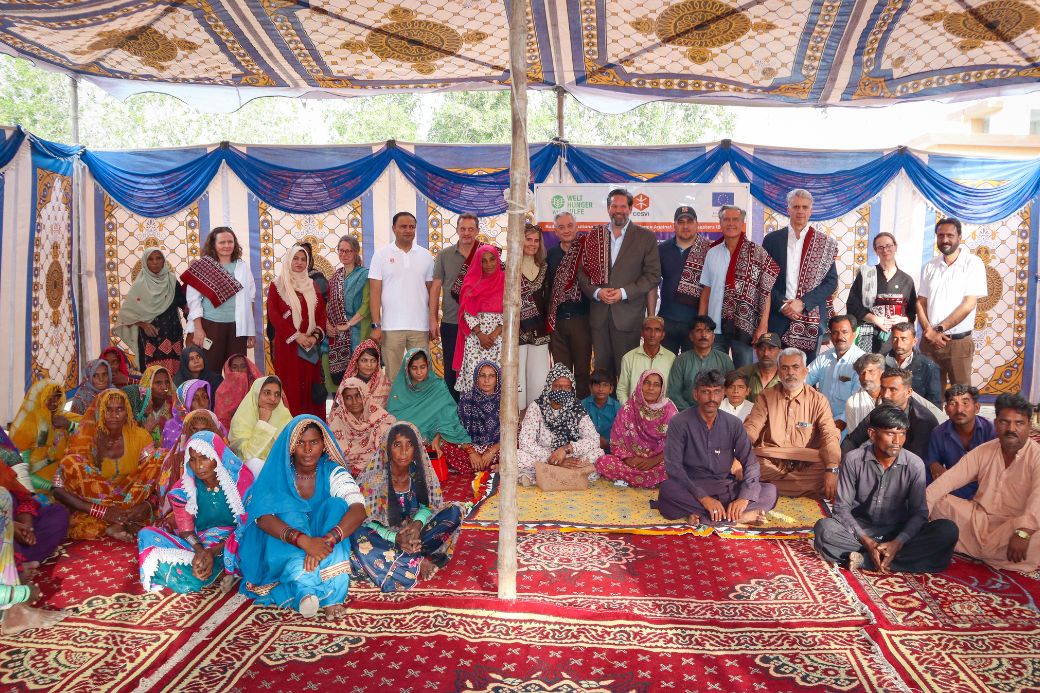A delegation from the European Parliament has recently visited several emergency interventions supported by the European Union and implemented by CESVI in the Sindh province of Pakistan, aimed at strengthening the resilience of local communities in the face of natural disasters and the effects of climate change.
The mission, composed of five Members of the European Parliament – Lukas Mandl, Robert Biedroń, Juan Fernando López Aguilar, Tomáš Zdechovský and Marc Jongen – together with representatives from ECHO Pakistan and the Delegation of the European Union in the country, had the objective of observing ongoing activities within the EU-supported Disaster Risk Reduction (DRR) initiatives implemented by CESVI and its Alliance2015 partner Welthungerhilfe, in collaboration with local authorities.
A shared commitment to reducing the risks of natural disasters
During the visit, the delegation met with representatives of the Sindh Provincial Disaster Management Authority to learn more about the emergency preparedness and response mechanisms supported by CESVI and Welthungerhilfe through the contribution of the European Union.
The parliamentarians visited intervention areas in the Mirpurkhas region, where CESVI and Welthungerhilfe work with local authorities to strengthen the capacity of communities to prevent and respond to extreme climate events. The delegation met with risk management committees and project beneficiaries, witnessing the results achieved in terms of improved preparedness, more effective early warning systems, and the active participation of women in decision-making processes.
During meetings with communities, Members of the European Parliament observed how the support of the European Union, through CESVI and Welthungerhilfe projects, has helped improve community resilience through more efficient planning, enhanced response capacity, and innovative technological tools.
“I am extremely impressed and grateful for the warm welcome received from the local community,” said Lukas Mandl, head of the mission from the Committee on Development (DEVE). “The challenges faced by Pakistani communities can only be overcome by transforming agricultural, housing and education systems – particularly girls’ education – and by creating greater opportunities for women in all sectors.”
CESVI: supporting Pakistan’s communities for over twenty years
For more than twenty years, CESVI has been working in Pakistan to support the most vulnerable communities in tackling the effects of climate change. In the Sindh province – one of the areas most affected by floods and droughts – CESVI, together with its partner Welthungerhilfe within the Alliance2015 network, is implementing the BRAND project – Building Institutional Capacity and Resilience Against Natural Disasters, funded by the European Union.
The project aims to strengthen institutional and community capacities in disaster prevention, management and mitigation. CESVI works with local authorities to develop climate risk response plans and modernise the early warning system, introducing operational procedures, forecasting models, and a mobile app that enables the population to receive real-time weather alerts and emergency information.
Alongside technology, CESVI also values traditional knowledge within local communities. A concrete example is the installation of colour-coded poles used to monitor water levels – a simple yet effective method to quickly alert families to the risk of flooding.
Another key component of the project focuses on training and awareness-raising. CESVI promotes collaboration between universities and public authorities to integrate disaster management and climate adaptation courses into academic curricula, supporting scientific research and improving the quality of information through the training of local media.
Finally, in case of emergency, CESVI is ready to activate a rapid response mechanism that ensures immediate financial support for the most vulnerable families, helping them meet their basic needs during times of greatest hardship.
A strategic partnership for resilience
The visit of the European delegation reaffirmed the European Union’s commitment to supporting Pakistan on its path towards greater resilience to natural disasters and climate challenges, in collaboration with humanitarian partners such as CESVI and Welthungerhilfe, government institutions, and local communities.
Thanks to these synergies, it is possible to strengthen risk governance, promote early warning mechanisms, and reduce the vulnerability of the most exposed populations – making a tangible contribution to a safer and more sustainable future for Pakistani communities.
